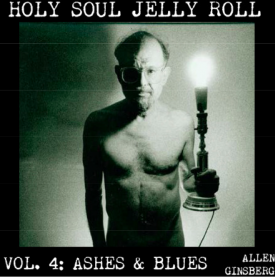Today marks the release of the final volume in the Allen Ginsberg box set Holy Soul Jelly Roll: Poems & Songs 1949–1993, a collection of previously released and unreleased recordings. For whatever reason, Ginsberg Recordings decided to stagger the digital release of the set over the month of September, beginning with Volume Four (Ashes & Blues), followed by Three (Ah!), Two (Caw! Caw!), and finally, today, Volume One (Moloch!). The last volume “contains the stunning 1956 Berkeley Town Hall reading of Ginsberg’s seminal poem ‘Howl,’ as well as other important historic early poems.” You can preview and buy all four volumes on iTunes, but you needn’t pay to hear some full tracks: Ginsberg Recordings made the “8 song sampler” available on Soundcloud for us. Here is the track listing:
1. A Supermarket In California
2. Green Valentine Blues
3. Kral Majales (King Of May)
4. CIA Dope Calypso
5. Laughing Song
6. First Party at Ken Kesey’s With Hell’s Angels
7. Vomit Express
Listening to these poems brings a couple things to mind. One, the realization, too often lost, that “There was a time when not every moment of our lives was recorded, photographed, tweeted, facebooked, or otherwise made instantly available to the global billions of the connected,” in the words of Ginsberg friend and archivist Stephen Taylor. In those ancient days, recordings mattered and the things people chose to put on tape or film or whatever medium they chose were precious because of their rarity and their fragile physicality. Two, these recordings underscore the perfect pitch of the collection’s title, which takes in all at once the complementary natures of Ginsberg the holy fool—mystic, trickster, and sensual “white Negro” (to take Norman Mailer’s snide 50s term for hipster bohemians). Ginsberg was all these things, usually in the same poem. His voice can slide in subtle or startling turns from bathos to pathos, from the fantastic imaginary to keenly-observed social critique.
In the first recorded poem above, “A Supermarket in California,” Ginsberg imagines himself shopping for groceries at night with Walt Whitman, an elaborate extended excursion into the poet’s process. In an intro, he calls this a “coming down” poem after writing “a lot of great poetry.” Reminiscent of Wallace Stevens’ “The Man on the Dump,” Ginsberg describes “shopping for images” in a “hungry fatigue… dreaming of your enumerations.” The “you” here is Whitman, and in the poem the two stroll down store aisles, sampling the “neon fruit” without paying. In a funny image, Ginsberg asks his muse, “which way are we going? Which way does your beard point tonight?” Maybe Ginsberg thought it a minor poem, but I’d call it a tiny delicacy next to the sprawling monster “Howl.”
Another short autobiographical poem above—well-stocked with images as precise, but not so neon, as “Supermarket”—is “First Party at Ken Kesey’s with Hell’s Angels.” I can only imagine this is an accurate account of events not much embellished but perceptively edited to give us an elliptical succession of loosely connected vignettes. None of the images surprise so much as confirm exactly what one expects to find at Ken Kesey’s (with Hell’s Angels): “Cool black night through the red woods,” “a few tired souls hunched over in black leather jackets,” “a yellow chandelier at three a.m.,” “twenty youths dancing through the vibration in the floor,” “a little marijuana in the bathroom,” and, of course, “four police cars parked outside the painted gate.” It’s not a masterpiece, but it’s a little showcase of Ginsberg’s talent for compression and, to use the word he applies to his hero Walt Whitman, “enumerations” of jazz-inflected lines that pop into focus with pleasing immediacy.
“CIA Dope Calypso” is also true to its title, an upbeat island-style ditty with congas, guitar and maracas–a song about the Southeast Asian heroin trade (allegedly!), Ginsberg sings, “supported by the C‑I-A.” Never afraid to hurl verbal Molotovs at his imperialist foes, Ginsberg does so here with strained and silly rhymes and a good deal of tongue-in-cheek in-joking. It’s a “jelly roll” performance—wickedly subversive.
All of these recordings are great fun, but Ginsberg seems best known for the “Holy Soul” part of his persona, the thundering prophet mystic warrior of “Howl,” and that’s here in the box set too, with “Howl” and other poems. We’ve previously featured Ginsberg’s riveting 1955 reading of the epic “Howl” at San Francisco’s Six Gallery, dramatized in Rob Epstein and Jeffrey Friedman’s semi-biopic Howl, with James Franco as Ginsberg. Below, see the poem’s apocalyptic “Moloch” section set to some terrifying animated images from the 2010 film:
If Holy Soul Jelly Roll doesn’t fully sate your taste for Ginsberg’s voice, never fear: there is much more to come from Ginsberg Recordings.
Josh Jones is a doctoral candidate in English at Fordham University and a co-founder and former managing editor of Guernica / A Magazine of Arts and Politics.



Leave a Reply